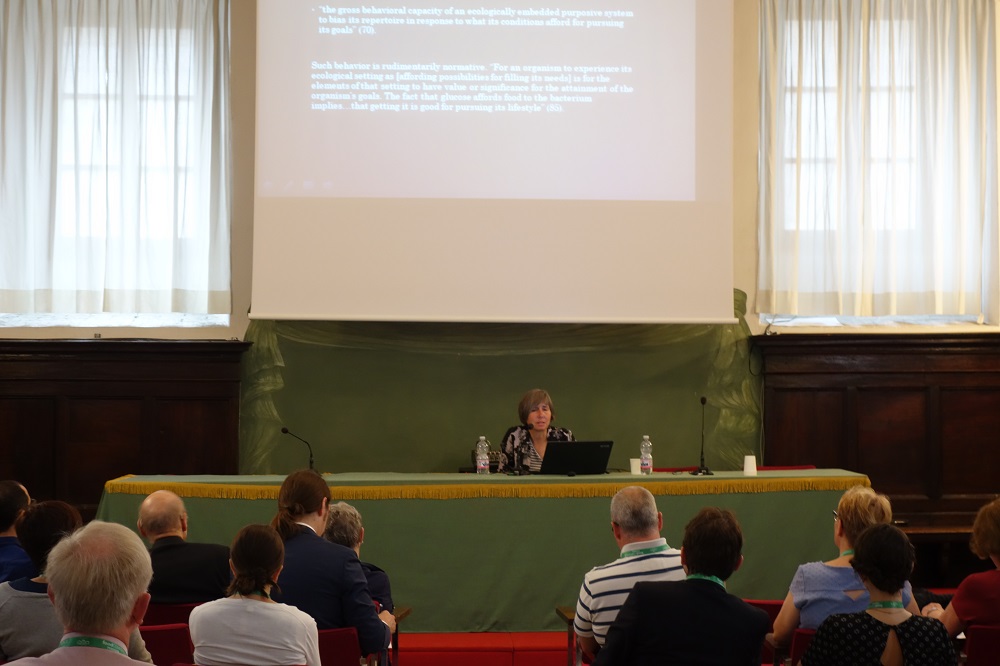PERUGIA, Italy—Professor Lisa Heldke of Gustavus Adolphus College presented a keynote speech at the bi-annual Food Conference: Perugia, an international scholarly meeting hosted by the Umbra Institute’s Center for Food & Sustainability Studies. This year’s conference was on “Exploring Ethics through Food Choices.” Heldke was therefore able to present her keynote “Stuck on You: Ethics in the Age of the Parasite”, a topic that falls closely in line with the ethical questions she asked in her most recent book, Philosophers at Table: On Food and Being Human. A key debate among food studies scholars, as well as among a much broader public, is how to organize food production, distribution, and consumption for the greatest good of living beings. Heldke’s keynote focused on this debate, with its point of departure being a proposal to refocus on death and to think of eaters as collections of organisms.
Heldke characterized these complex collections of organisms that are humans as relationships of “chomping and being chomped.” The concept of agency—so crucial for Enlightenment thinkers and most of us today—has separated humans from the rest of life. Once we put agency on a continuum, Heldke argued, once we experience ourselves as communities. Using a mix of examples and a dash of humor, Heldke suggested that once we move eating and being eaten from the morally problematic to the matter-of-fact, humans will have an opportunity to approach our eating choices in a different ethical spirit.
The keynote was then followed by spirited debate with questions from food studies scholars across disciplines. Food and ethics intersect at many levels, from personal daily choices on where to shop and what to eat to cultural norms and regulations, policy implementations on national and international scales, and debates over scientific research on biotechnology. Conference attendees seemed to mirror the reality of the range of food issues as they addressed these relationships from the perspective of food choices, while being reflective of the diversity of their own scholarly backgrounds.
Zachary Nowak, the associate director of the Center for Food & Sustainability Studies and one of the conference co-organizers, commented that Heldke’s perspective provoked valuable dialogue that continued well beyond the keynote discussion. He reflected that the ethical dilemmas about agency and the non-uniqueness of humans are not simply academic discussions limited to the medieval cloister where the conference took place but they are being debated by people all over the world. He added, “We’re excited that Lisa Heldke could start discussions that the conference attendees will share with their colleagues, their students, their community members, and the readers of their books.”
This year marks the fourth time that the conference was held and the organizers confirmed that they will be repeating the event in 2020. The Umbra Institute’s academic director, Dr. Francesco Burzacca expressed his belief in the importance of the conference: “The Institute organizes the conference to contribute to the rapidly-expanding field of food studies. We’re proud of our Center for Food & Sustainability Studies which continues to be a node for the international network of scholars studying food.”
About Umbra’s Center for Food & Sustainability Studies
The Center hosts the Food & Sustainability Studies Program, an interdisciplinary curricular concentration at the Umbra Institute, an American study abroad program located in the central Italian city of Perugia. Often called a “big university town in a small Italian city,” Perugia is the ideal setting to study abroad in Italy, with fine arts, business, and liberal arts courses. For more information about the Umbra Institute or its Center for Food & Sustainability Studies, contact info@umbra.org.

Leave a Reply
You must be logged in to post a comment.